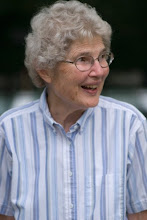I am currently in Greensboro, North Carolina, participating in Orson Scott Card's "Literary Boot Camp"--an intense, week-long writing class and workshop with a writer I admire. Last night, he sent us out onto the town with instructions to find story ideas: two from observation, one from an interview, and two from research.
It was awesome.
I wandered up Highpoint Road first, and stepped into a small side gate of a large cemetery--full of Guralniks and Stadiems and Isaacsons and Goldbergs. Completely Jewish with headstones dating back to the late 1800s. Evidence of a long history of Jewish Greensboro.
Behind the cemetery were some woods. I walked next to them down the road, wondering if there would be a synagogue on the other side--but there was a little Christian church instead (I think it was called Sunrise Ministries or something). Past the church was a little path down into the woods, so of course I followed it. North Carolina woods are pretty spectacular--tall pines taking out the sky, but leaving enough room for thick green growth on the ground and long vines winding up around their narrow trucks. I walked, and I watched the fireflies rise up out of the grasses and along the stream bed. And I thought about the people who used to run and hide in woods like these. Wondered how, once they got far enough for dogs not to track them, anybody ever managed to hunt them down.
I came out of the woods again and watched people sitting on porches or gathering on lawn chairs around tables under trees. Watched a lot of people talking on cell phone in the cars, windows rolled down in the driveway. I worried for a minute I might not find the noise and landmarks of Highpoint again...just be lost in this nice southern neighborhood.
But it wasn't long before I found Highpoint again, stepped into one little corner grocery with no produce and barely any grain (unless you count Doritos or Potato chips) and then out again to see if I could find a place that could at least sell me a tomato.
I noticed another hole-in-the-wall grocery back in the direction of my motel, close to where I'd seen the cemetery. Though I knew it was a long shot, I decided to give it a chance.
There was not a single piece of produce in sight, but there was a nice guy with a thick local accent who was willing to give me directions to another grocery store. It was farther than I wanted to walk at the time, but he was a nice guy, so I asked him if he knew anything about the cemetery.
"Oh, for that you've got to talk to the boss," he said. "He's the man to talk to about anything in Greensboro." So he took me into the store and introduced me.
His boss was a 70-year-old Palestinian Christian emigrant named Nabeel, and he wrote down the address of the nearest Jewish school for me in case I wanted to go there at the same time as he explained to me how Judaism and Zionism are two very different things, and that he doesn't mind the one even though he hates the other. Then he told me all kinds of things about his village outside Tel Aviv, overlooking the Mediterranean, where everybody knew you and if you got sick people just popped in with soup or bread--ready to help without even being asked. He talked about the old family business making soap out of pure olive oil. "With that soap, you never get dandruff," he said. "Hundreds of years before Tide, my family was making that soap!" He talked about missing the village, about high school and East Jerusalem, about how attacks interrupted life and how that still didn't mean he could count someone he saw as a freedom fighter as a terrorist. I asked him if he wanted to go back "there" and he told me he was glad I didn't use the word Israel (even though it was more accident than choice).
When he asked what my name was and I said James, he told me that was crap. He asked what it really was, my Hebrew name, and I said it would be Yaakov. He said, "oh yes! Yacub. I had an uncle with that name."" And he insisted on referring to me as Yacub for the rest of our conversation.
It was a pretty amazing interview. Good to have a writing exercise to help justify talking to strangers.
Stewardship Today
-
For Sunday school today, Nicole I decided to skip ahead a week to cover
Doctrine & Covenants 42. It's the section people in Kirtland called "The
Law": we w...
3 years ago
